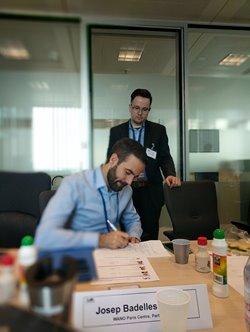Josep Badelles Bellver is a young nuclear professional working for WANO in Paris. He provides us with an exclusive insight into the benefits of working for WANO, and explains how his secondment is helping his personal development and career.
 What was your career background before joining WANO as a secondee?
What was your career background before joining WANO as a secondee?
I graduated as a mechanical engineer in Spain then finished my studies in Germany, focussing on reactor safety. Before joining WANO Paris Centre, I worked in Germany for RWE for over 10 years, based at its Essen headquarters. I started as a trainee and gained experience at variety of nuclear power plants during my time there.
My most recent role at RWE was in the department of nuclear safety and technology, where I worked on safety analysis for power plants, including post-Fukushima analysis and periodic safety reviews. I also worked within operating experience and was responsible for the oversight of Biblis power plant.
Why did you join WANO?
I wanted to get involved with WANO to gain international experience and a wider understanding of different working practices. I also wanted to learn how counterparts from other countries work and obtain experience of different technologies.
What is your role at WANO Paris Centre?
I work in the peer review team. I initially joined as area lead for the engineering aspect of peer reviews, and then became area lead for organisation and administration. I am now a peer review team coordinator, and will be a follow up peer review team leader by the end of the year.
What have been key benefits of working in your role?
The flexibility of the role has been great. By this I mean learning to be adaptable and to work with people from different backgrounds and cultures. It has been immensely rewarding for me. For peer reviews, the team has to make the review happen quickly when visiting a nuclear power plant. Reviews typically take two to three weeks and the key to their success is the ability for the team to adapt and work closely and quickly to achieve the best results. The key challenge is to build the team to gain maximum benefit from the different working cultures present. You have a short period to conduct the review, and for that you need a close-knit, high performing team.
Another benefit - from my perspective as an engineer - is the opportunity to get to know other technologies. Additionally, being able to work using different languages has really boosted my confidence.
How have you found living in Paris?
It’s like a dream living in this great city! You have so many different options of things to do, and places to explore. Paris is amazing - although I would like more time to enjoy it as I am often travelling for peer reviews!
What will you do next?
I will probably extend my secondment for two more years, and then I would like to become a team leader or work on member support missions. In this way, I can gain different perspectives, to see how we can help members find solutions to their challenges and improve.
After this, I will return to Germany to help manage the decommissioning process. This will be something completely different – as it is a new area in Germany with new challenges. This is why obtaining different perspectives and leadership skills through my work at WANO will be invaluable in helping achieve a successful decommissioning process in Germany.
How can we help the young generation of nuclear professionals?
In some countries, the nuclear industry is very conservative. It is experienced-based and rigid. This needs to evolve in order to face upcoming challenges. Encouraging and developing promising young professionals from all backgrounds into leadership positions earlier enables utilities and power plants to become more flexible and agile. Young professionals bring an invaluable, innovative perspective and deliver fresh ideas that are enormously beneficial to the industry.